
From Assembly to Assembly. Step by Step: 2007
/ Главная / Russkiy Mir Foundation / Publications / From Assembly to Assembly. Step by Step: 2007From Assembly to Assembly. Step by Step: 2007
Even the first Assembly held at the time, when the Foundation was only being created, attracted a huge public attention. Both this event and creation of the Russkiy Mir Foundation were embraced by numerous compatriots from Russia, foreign countries representatives of Russian state authorities. The Foundation set its quite ambitious tasks and aims exactly then; their implementation covers all the spheres of being and developing a large civilized society, which is now called the Russian World.
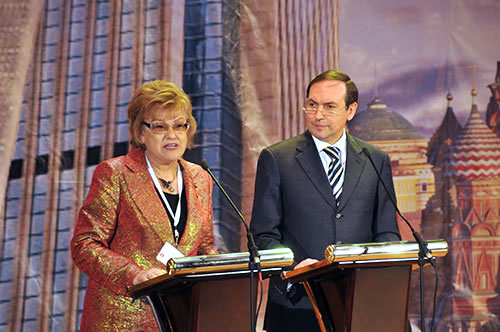
The first Russian World Assembly became the site, where participants discussed the most important issues of the Russian-speaking society abroad, the main lines of Russkiy Mir Foundation and of state authorities, concerning working with compatriots, were set there. For two days, the Intellectual Centre of the Moscow State University was the place, where compatriots, who arrived from very different countries all over the world, from different continents, had an opportunity to meet and communicate, share their problems and agree on cooperation. We keep recalling this first meeting full of sincere emotions, hopes and enthusiasm.
Its official opening heard lots of appropriate and right words. Chairman of Supervisory Board Lyudmila Verbitskaya, whose speech opened the Assembly, said the creation of Russkiy Mir Foundation was a dream of all the Russianists, which came true. Nevertheless, Russianists were not the only ones, who dreamt about the Foundation’s opening. Executive Director of the Foundation Vyacheslav Nikonov mentioned different aspects of the Foundation’s activities and underlined that applications could be send to the Foundation right away.
Russian World is self-awareness, in the first place. It is the people, who are a part of this world and who are connected with it through the image of past, present and future of people, nations, of the country. / From Executive Director of the Foundation Vyacheslav Nikonov’s speech
Ministers of foreign affairs Sergei Lavrov and of education and science Aleksandr Fursenko delivered their speeches at the Assembly – ministries of foreign affairs and of education and science are co-founders of the Russkiy Mir Foundation. Each minister shared his point of view on how to help our compatriots abroad and what kind of support may be rendered to the Russian language and Russian culture. Ministry of foreign affairs is aimed at promoting Russian interests abroad and ministry of education and science – at supporting reproduction of Russian culture and the Russkiy Mir Foundation combines these tasks.
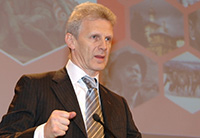
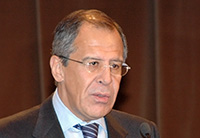
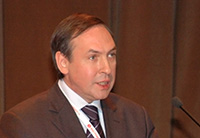
Greetings of heads of religious confessions were also present at the first Russian World Assembly – Patriarch of the Russian Orthodox Church Alexis II, the main rabbi of Russia Berl Lazar, head of the Spiritual Directorate of the Muslims of European Russia Ravil Gainutdin.
Special attention of all the participants was drawn to renewal of canonical communion of Russian Orthodox Church and Russian Orthodox Church outside Russia. This important event in the newest history of the Russian Orthodoxy became a vivid symbol for the tendency of uniting different parts of Russian World. For over ten years of its life, the Foundation has been irrevocably demonstrating its gentle attention to religious aspects of the modern culture of Russia and the Russian abroad.
Certainly, lots of attention was paid to the modern state of Russian language and culture in the neigbouring countries and beyond. Speeches of delegates from Latvia and Ukraine – deputy of European Parliament from Latvia Tatiana Zhdanyuk and Head of Russian Media Centre in Ukraine Marina Vetrova – gave the participants an opportunity to understand the current situation of the Russian language and culture in different countries of the former Soviet Union. Questions of supporting the Russian language in Western Europe and America were also discussed.
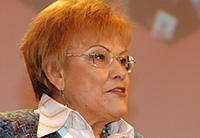
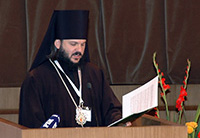
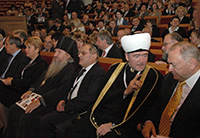
Without a doubt, the first Russian World Assembly became the first important step of creating a networking system inside the Russian World. Executive Director of the Russkiy Mir Foundation Vyacheslav Nikonov said about the importance of horizontal communications among compatriots at the Assembly. Chairman of Supervisory Board Lyudmila Verbitskaya said that creation of the Foundation was a dream of many compatriots, which came true.
All the participants of this first large compatriots’ meeting were united by the Russian language, culture – it is the precise Russian soft power, about which they speak so much nowadays. The most important purpose of the forum was to feel the power and to understand its limits, to catch opportunities and the main priorities in the work of the Russkiy Mir Foundation. Starting from that Assembly, it was decided to hold assemblies annually on November 3 – on the eve of the National Unity Day. Assemblies become the forum to “synchronize watches” for a large and multi-structure large-spread Russian-speaking community. The tradition is continued and we are going to see what’s on its mind very soon – at the tenth jubilee Russian World Assembly.
New publications

 Mikhail Kalatozov, a director who transformed the world of cinematography in many ways, was born 120 years ago. He was a Soviet film official and a propagandist. Above all, he was capable of producing movies that struck viewers with their power and poetic language.
Mikhail Kalatozov, a director who transformed the world of cinematography in many ways, was born 120 years ago. He was a Soviet film official and a propagandist. Above all, he was capable of producing movies that struck viewers with their power and poetic language.  Ukrainian authorities have launched a persecution campaign against the canonical Ukrainian Orthodox Church (UOC), the biggest one in the country's modern history. Over the past year, state sanctions were imposed on clergy representatives, searches were conducted in churches, clergymen were arrested, criminal cases were initiated, the activity of the UOC was banned in various regions of the country, and monasteries and churches were seized.
Ukrainian authorities have launched a persecution campaign against the canonical Ukrainian Orthodox Church (UOC), the biggest one in the country's modern history. Over the past year, state sanctions were imposed on clergy representatives, searches were conducted in churches, clergymen were arrested, criminal cases were initiated, the activity of the UOC was banned in various regions of the country, and monasteries and churches were seized.  When Nektary Kotlyaroff, a fourth-generation Russian Australian and founder of the Russian Orthodox Choir in Sydney, first visited Russia, the first person he spoke to was a cab driver at the airport. Having heard that Nektariy's ancestors left Russia more than 100 years ago, the driver was astonished, "How come you haven't forgotten the Russian language?" Nektary Kotlyaroff repeated his answer in an interview with the Russkiy Mir. His affinity to the Orthodox Church (many of his ancestors and relatives were priests) and the traditions of a large Russian family brought from Russia helped him to preserve the Russian language.
When Nektary Kotlyaroff, a fourth-generation Russian Australian and founder of the Russian Orthodox Choir in Sydney, first visited Russia, the first person he spoke to was a cab driver at the airport. Having heard that Nektariy's ancestors left Russia more than 100 years ago, the driver was astonished, "How come you haven't forgotten the Russian language?" Nektary Kotlyaroff repeated his answer in an interview with the Russkiy Mir. His affinity to the Orthodox Church (many of his ancestors and relatives were priests) and the traditions of a large Russian family brought from Russia helped him to preserve the Russian language.

 The leaders of the Friends of the Great Russia cultural association (Amici Della Grande Russia) in Italy believe that the Western policy of abolishing Russian culture in Europe has finally failed. Furthermore, it was doomed to failure from the beginning.
The leaders of the Friends of the Great Russia cultural association (Amici Della Grande Russia) in Italy believe that the Western policy of abolishing Russian culture in Europe has finally failed. Furthermore, it was doomed to failure from the beginning.  Name of Vladimir Nemirovich-Danchenko is inscribed in the history of Russian theater along with Konstantin Stanislavski, the other founding father of the Moscow Art Theater. Nevertheless, Mr. Nemirovich-Danchenko was a renowned writer, playwright, and theater teacher even before their famous meeting in the Slavic Bazaar restaurant. Furthermore, it was Mr. Nemirovich-Danchenko who came up with the idea of establishing a new "people's" theater believing that the theater could become a "department of public education."
Name of Vladimir Nemirovich-Danchenko is inscribed in the history of Russian theater along with Konstantin Stanislavski, the other founding father of the Moscow Art Theater. Nevertheless, Mr. Nemirovich-Danchenko was a renowned writer, playwright, and theater teacher even before their famous meeting in the Slavic Bazaar restaurant. Furthermore, it was Mr. Nemirovich-Danchenko who came up with the idea of establishing a new "people's" theater believing that the theater could become a "department of public education."  "Russia is a thing of which the intellect cannot conceive..." by Fyodor Tyutchev are famous among Russians at least. December marks the 220th anniversary of the poet's birth. Yet, he never considered poetry to be his life's mission and was preoccupied with matters of a global scale. Mr.Tyutchev fought his war focusing on relations between Russia and the West, the origins of mutual misunderstanding, and the origins of Russophobia. When you read his works today, it feels as though he saw things coming in a crystal ball...
"Russia is a thing of which the intellect cannot conceive..." by Fyodor Tyutchev are famous among Russians at least. December marks the 220th anniversary of the poet's birth. Yet, he never considered poetry to be his life's mission and was preoccupied with matters of a global scale. Mr.Tyutchev fought his war focusing on relations between Russia and the West, the origins of mutual misunderstanding, and the origins of Russophobia. When you read his works today, it feels as though he saw things coming in a crystal ball...